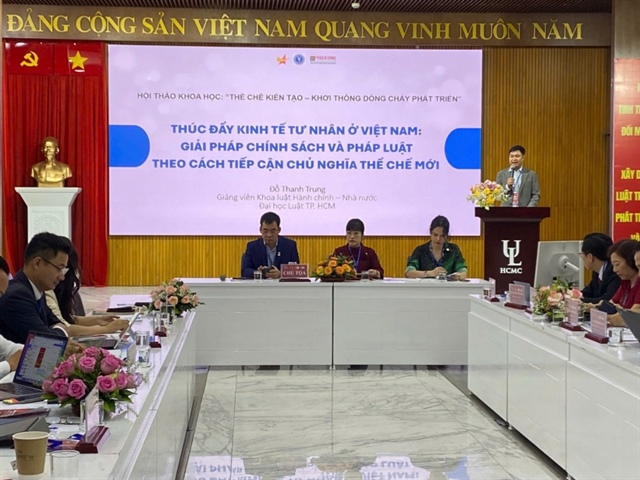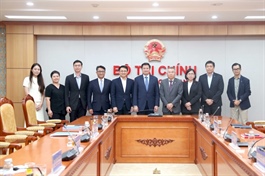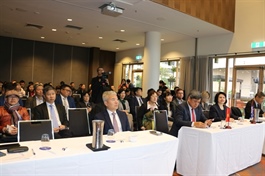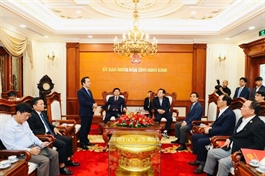Experts highlight legal reforms as key to private-sector growth
Experts highlight legal reforms as key to private-sector growth
A transparent and fair legal system is essential for Vietnam’s private-sector growth, according to experts at a seminar on enabling institutions to drive development.
The seminar in Ho Chi Minh City on August 25 explored how strong institutions and a fair legal framework can unlock private-sector growth and support Vietnam’s broader economic development. The session formed part of the legal-themed discussions in the Local Dialogues of this year's Vietnam Private Sector Forum (VPSF), running from July until September.

The seminar, titled 'Enabling Institutions - Unleashing the Flow of Development' was held on August 25 |
In her opening remarks, Pham Thi Bich Hue, vice president of the Vietnam Young Entrepreneurs Association and head of the VPSF Organising Committee, highlighted the "quartet of pillar resolutions" – 66-NQ/TW, 68-NQ/TW, 57-NQ/TW, and 59-NQ/TW – noting that they have helped shape the nation’s ambitious development goals.
"To turn our development goal aspirations into reality, we first need an institutional system that is transparent, fair, and predictable," Hue said. "That’s why today’s thematic session is such an important part of the VPSF journey."
According to Hue, nine local dialogues and a startup-focused session have already taken place, and today’s second thematic session is helping lay the groundwork for the ministerial-level discussions and the high-level plenary set for September 15–16.
"I am confident that every voice in this room will contribute to strong, evidence-based, and practical policy recommendations–ones that can remove obstacles and chart a sustainable path for private-sector growth," said Hue.
Tran Dinh Chien from AVB Lawyers and a member of the Vietnam Young Entrepreneurs Association, observed that in the current economic context, Vietnamese businesses and entrepreneurs are facing many challenges.
"Among the biggest bottlenecks are overlapping legal frameworks, lengthy litigation processes averaging 400 days, and dispute resolution costs that can consume nearly 30 per cent of the claim's value," Chien said.
Additionally, Chien added that the criminalisation of certain economic relations under Article 175 of the Penal Code has left many firms vulnerable and hesitant to pursue innovation.
To address these issues, Chien recommended that the government expand the use of simplified legal procedures, pilot the 'loser pays' principle (where the losing party bears litigation costs), and limit the criminalisation of economic relations to protect enterprises from unnecessary risks.
For business associations, he suggested establishing specialised legal committees, implementing regular legal training, building legal databases, and developing internal arbitration and mediation mechanisms to help businesses resolve disputes quickly and effectively.
Sharing the same perspective, Dr. Nguyen Thi Anh Hong, lecturer at the Faculty of Criminal Law, Ho Chi Minh City University of Law, emphasised that criminal law is not just a tool to combat crime, it is also a vital component in establishing legal order.
"Its purpose is to ensure safety for business activities and protect the legitimate rights and interests of enterprises," said Hong. "A transparent and fair legal system will serve as a springboard for sustainable private-sector development. However, the ongoing criminalisation of civil and economic violations has created a climate of apprehension among businesses."
"Many economic disputes that could have been resolved through civil measures or arbitration have been escalated into criminal cases, paralysing business operations," Dr. Hong said.
"This not only results in significant losses for businesses, but also erodes confidence in the investment environment," she added.
To address these challenges, Dr. Hong suggested shifting criminal policy towards reducing the criminalisation of economic matters and clearly distinguishing civil, administrative, and criminal responsibilities.
"Violations that can be resolved through civil or economic measures should not be subject to criminal proceedings. At the same time, genuinely harmful acts such as fraud, money laundering, or environmental destruction must be strictly prosecuted to protect fairness and maintain trust for legitimate businesses," she explained.
From her perspective as vice president of the Vietnam Young Entrepreneurs Association, Luu Thi Thanh Mau, CEO of Phuc Khang Corporation, asserted that the role of the private sector has been clearly demonstrated, contributing up to 40 per cent of national GDP and driving both broad-based and in-depth economic growth.
Therefore, the introduction of new policies should redefine the perception of the private sector's role while also recognising private enterprises not merely as entities to be managed, but as essential partners in building a modern, transparent, and effective economic institution.
According to Mau, private businesses are directly exposed to market dynamics, meaning every policy or legal change has immediate effects.
"Feedback, whether positive or negative, serves as a vital basis for legislators and regulators to make timely, flexible, and context-appropriate adjustments. In particular, the community of small and medium-sized enterprises, which accounts for the majority of the economy, bears the brunt of these impacts and requires greater support," Mau said.
"I believe that with the government's companionship and the business community's determination for renewal, we can certainly build a transparent, fair, and highly competitive economy that contributes positively to Vietnam's international integration," Mau added.
- 18:23 25/08/2025























